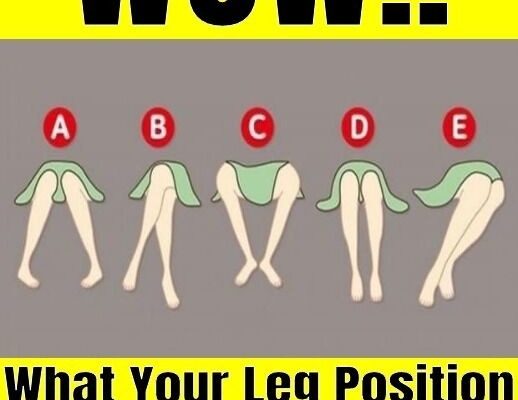Take note of someone’s seating position the next time you’re with them if you want to understand more about their personality.
Seeing someone sit in the “A” position indicates they would rather avoid dealing with their difficulties. Instead of tackling their problems, they ignore them or blame others for them.

This preference can result in lost time and missed opportunities. These people, on the other hand, are frequently pleasant, inventive, and childlike. They have a certain magnetism that attracts people, even though they occasionally talk without thinking.
The B position is also highly revealing when analyzing someone’s seated posture. A person sitting with one leg crossed over the other distinguishes this stance.
Those who adopt this posture are usually highly private and keep their inner lives secret. They may have secrets they do not want others to know about and might be relatively quiet in social circumstances.
Despite this, they may be knowledgeable and wise, making them fascinating people to get to know.
Individuals described in the preceding chapter have a fantastic imagination and a penchant for daydreaming. Their creative ideas are highly valued at work, and their contempt for monotony drives them to seek out new experiences, explore the world, and build significant connections wherever they go.
When dissatisfied with their condition, they are confident to start again and work their way up. They appreciate their time and energy and will not squander it on unsatisfying relationships or draining careers.
On the other hand, those in the comfort-seeking C position value their comfort above everything else. They take satisfaction in reaching perfection in their things or experiences and may become obsessed with pursuing that ideal.
They pay special attention to personal items such as clothing, shoes, perfumes, and more substantial assets such as furniture.
However, their meticulousness is frequently offset by their disorganization, and they may need help keeping their attention in hectic or chaotic surroundings.
Others may find their lack of attentiveness offensive since it can come across as dismissive or even arrogant when they are not paying attention to what is being said.
Finally, the dreamer and the comfort-seeker contribute distinct strengths and challenges to their respective roles. While one is a risk-taker and a creative inventor, the other values stability and physical comfort.
They can both contribute to a productive and fulfilling working environment by acknowledging their biases and working to mitigate their limitations.
A person’s sitting posture can indicate a lot about their personality. Those who prefer to sit upright and despise being late are frequently astute and vulnerable.
They respect their peace of mind and hesitate to express too many emotions. Kissing is an intimate act that should not be performed in public.
Individuals who sit with their feet firmly planted on the ground, on the other hand, tend to be more open and expressive of their emotions. They may appear rude sometimes but are not afraid to express their feelings.
Those who keep their feet crossed or folded under their chairs may struggle with socializing and regard it as a competition in which they must be wary of their competitors.
They seek refuge in their houses, where they may let down their guard and unwind. However, they may have difficulty receiving criticism since it feels personal.
People in the “E” position are usually patient and tenacious. They value appearance and are willing to try to look their best. They do not rush themselves or others because they think everything will work out quickly.
However, this could be due to their lack of self-confidence and inner unease. They find it challenging to deal with criticism because they take it personally and feel the need to defend themselves.
The sitting position can provide insight into a person’s nature. A simple seating decision can reveal a lot about a person, from their level of vulnerability to their confidence and emotional expression.



